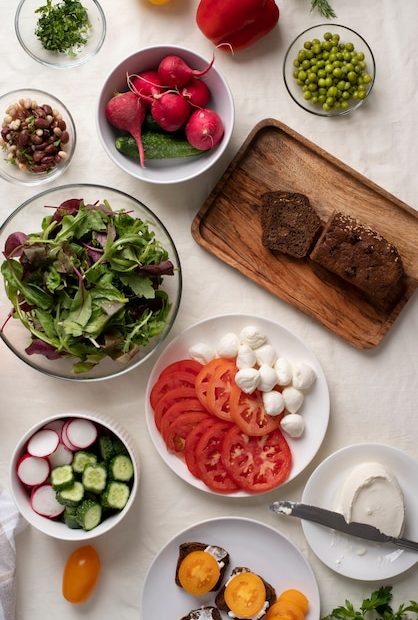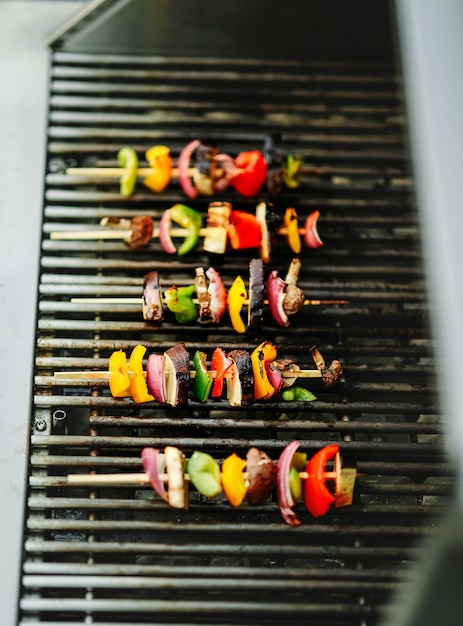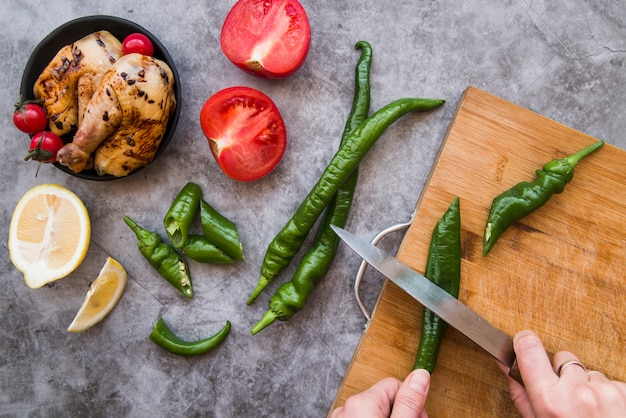Do you grill or roast vegetables?
When it comes to cooking vegetables, there are many ways to bring out their natural flavors and textures. Two popular methods for preparing vegetables are grilling and roasting. While both techniques can result in deliciously cooked veggies, each offers its own unique benefits and flavors.
Grilling Vegetables
Grilling vegetables is a fantastic way to add a smoky and charred flavor to your dishes. Whether you’re firing up the barbecue or using a grill pan indoors, grilling vegetables creates a wonderful contrast between the crispy exterior and tender interior.
One of the advantages of grilling vegetables is the ability to cook them quickly. The high heat of the grill helps retain their natural moisture and nutrients, resulting in vibrant and flavorful vegetables. It’s also a versatile method that works well for a wide range of vegetables including bell peppers, zucchini, eggplant, corn, and mushrooms.
TIP: To prevent smaller vegetables from falling through the grill grates, consider using skewers or a grilling basket.
Roasting Vegetables
Roasting vegetables involves cooking them in the dry heat of an oven. This technique allows the natural sugars in the vegetables to caramelize, enhancing their sweetness and depth of flavor. Roasted vegetables often have a tender yet slightly crisp texture, making them a delightful addition to any meal.
One of the main benefits of roasting vegetables is the ease of preparation. Simply toss them in olive oil, sprinkle with herbs and spices, and let the oven work its magic. Roasting is particularly effective for root vegetables like carrots, potatoes, parsnips, and beets, as it brings out their natural earthy flavors.
PRO TIP: For extra flavor, try adding minced garlic or a sprinkle of grated Parmesan cheese to your roasted vegetables before cooking.
Choosing the Right Method
The choice between grilling and roasting vegetables ultimately depends on personal preference and the desired outcome. If you’re looking for a quick and intense burst of flavors with a smoky touch, grilling is an excellent option. On the other hand, if you prefer a caramelized sweetness and a slightly softer texture, roasting is the way to go.
However, don’t limit yourself to just one cooking method. Experimenting with both grilling and roasting can open up a world of exciting and delicious possibilities. You can also combine these techniques, such as grilling vegetables for a charred exterior and then finishing them off in the oven to ensure even cooking.
QUOTE: “Grilling and roasting are both fantastic methods for cooking vegetables, offering unique flavors and textures that can elevate any dish.” – Chef Emily Stevens
No matter which method you choose, it’s important to keep in mind the specific cooking times and temperatures for different vegetables. Some may require higher heat and shorter cooking times, while others benefit from lower heat and longer roasting. Additionally, proper seasoning with herbs, spices, and oil can enhance the flavors even further.
Incorporating Grilled or Roasted Vegetables into Your Meals
Grilled or roasted vegetables can be enjoyed in numerous ways. They make a delicious side dish to accompany grilled meats or can be added to salads, pasta dishes, sandwiches, and wraps. You can even use them as toppings for pizzas or stuff them into quesadillas for a flavorful twist.
For those who prefer a plant-based diet, grilled or roasted vegetables can be the star of the show. Create vibrant vegetable skewers for a summer barbecue or toss them with your favorite grains for a hearty and nutritious meal.
TIP: Don’t be afraid to get creative with seasonings and marinades to enhance the flavors of your grilled or roasted vegetables. Try experimenting with lemon zest, balsamic glaze, soy sauce, or a sprinkle of chili flakes.
Remember, whether you choose to grill or roast your vegetables, they are sure to add a burst of color, flavor, and nutrients to your plate. So, fire up the grill or preheat that oven, and get ready to savor the deliciousness of grilled or roasted veggies!
Roasting vs. Grilling Vegetables – What’s the Difference
Introduction
When it comes to cooking vegetables, there are various methods that can be used to bring out their natural flavors and enhance their texture. Two popular cooking techniques are roasting and grilling, each offering unique results. Understanding the differences between these methods can help you decide which approach is best suited for your culinary needs.
Roasting Vegetables
Roasting involves cooking vegetables in the oven at a high temperature. This method typically requires tossing the vegetables with oil, salt, and other desired seasonings before spreading them out on a baking sheet. The dry heat of the oven caramelizes the natural sugars in the vegetables, resulting in crisp exteriors and tender interiors.
“Roasting vegetables intensifies their natural flavors and creates a wonderful depth of taste.” – Chef Emma Johnson
Roasting works well with a variety of vegetables, including root vegetables like potatoes, carrots, and parsnips, as well as cruciferous vegetables like broccoli and cauliflower. It is a versatile cooking method that allows you to experiment with different flavors and combinations.
Grilling Vegetables
Grilling vegetables involves cooking them on a heated grill or barbecue. This method imparts a smoky flavor and charred exterior to the vegetables while maintaining their natural crunch. Grilling is perfect for outdoor gatherings and adds a touch of excitement to your culinary experience.
“Grilling vegetables brings out their natural sweetness and provides a delightful smoky taste.” – Chef Mark Thompson
Vegetables like bell peppers, zucchini, asparagus, and eggplant are particularly well-suited for grilling due to their sturdy texture. However, softer vegetables can also be grilled using skewers or grill baskets to prevent them from falling through the grill grates.
Comparison
| Roasting Vegetables | Grilling Vegetables |
|---|---|
| Requires oven or stovetop cooking | Requires a grill or barbecue |
| Caramelizes sugars for a sweeter flavor | Imparts smoky flavor and charred exterior |
| Tender interiors with crispy exteriors | Maintains natural crunch |
| Works well with root vegetables and cruciferous vegetables | Suitable for sturdy vegetables like bell peppers and zucchini |
Is it better to roast or grill vegetables?
When it comes to cooking vegetables, two popular methods are roasting and grilling. Both techniques enhance the flavors and textures of vegetables, but they offer different results. Let’s explore the benefits and drawbacks of each option.
Roasting Vegetables
Roasting vegetables involves cooking them in an oven at a high temperature. This method allows the vegetables to caramelize, bringing out their natural sweetness and creating a delicious crispy exterior. Roasting is great for root vegetables like potatoes, carrots, and parsnips.
Benefits of roasting vegetables:
- Caramelization enhances their natural flavors.
- Vegetables become tender on the inside.
- You can easily control the level of crispiness.
“Roasting vegetables brings out their natural sweetness and creates a delicious crispy exterior.”
Grilling Vegetables
Grilling vegetables involves cooking them over an open flame or on a grill pan. This method imparts a smoky flavor and adds a charred element to the vegetables. Grilling works well for vegetables that have a higher water content, like peppers, zucchini, and eggplant.
Benefits of grilling vegetables:
- Vegetables develop a smoky flavor.
- The charring adds a pleasant texture.
- Grilling is a quick cooking method.
“Grilling vegetables imparts a smoky flavor and adds a charred element, enhancing their taste.”
Ultimately, whether to roast or grill vegetables depends on personal preference and the specific vegetables being cooked. It’s worth experimenting with both methods to find out which one you prefer for different types of vegetables. Some vegetables may work better roasted, while others shine when grilled. The good news is that both options offer delicious ways to enjoy the natural flavors of vegetables.
Should vegetables be roasted covered or uncovered?
Roasting vegetables is a popular cooking method that brings out their natural flavors and creates delicious caramelization. However, when it comes to roasting, there’s always a debate about whether vegetables should be covered or left uncovered in the oven. Let’s explore the benefits of each method to help you decide which technique suits you best.
Covered Roasting
One approach to roasting vegetables is to cover them with foil or a lid during the cooking process. This method helps to retain moisture and prevents the vegetables from drying out. Covered roasting works well for delicate vegetables such as asparagus, broccoli, and Brussels sprouts, as it allows them to steam and cook evenly without losing too much moisture.
Benefits of covered roasting:
- Keeps the vegetables moist
- Ensures even cooking
- Prevents outer layers from burning
- Retains more nutrients
Uncovered Roasting
On the other hand, uncovered roasting involves placing the vegetables directly on the baking sheet without any covering. This method allows the vegetables to develop a crispy texture and enhances their natural flavors through caramelization. Uncovered roasting is ideal for starchy vegetables like potatoes, carrots, and parsnips, as it helps to achieve a nice golden exterior.
Benefits of uncovered roasting:
- Creates a crispy texture
- Enhances flavors through caramelization
- Allows for browning and charring
- Encourages a rich, roasted taste
“Covered roasting keeps the vegetables more moist, while uncovered roasting creates a crispy texture and enhances flavors through caramelization.”
Ultimately, whether to roast vegetables covered or uncovered depends on personal preference and the type of vegetables you are cooking. For a softer texture and moister result, covered roasting is a great choice. If you prefer a crispy exterior and deeper flavors, opt for uncovered roasting. You can also experiment with a combination of covered and uncovered techniques by starting with a cover and then removing it towards the end to achieve the desired texture.
| Method | Advantages |
|---|---|
| Covered Roasting | Retains moisture, prevents burning, ensures even cooking |
| Uncovered Roasting | Creates a crispy texture, enhances flavors through caramelization, encourages browning and charring |
Which Vegetables Can You Roast?
Introduction
Roasting vegetables is a popular cooking method that brings out their natural flavors and caramelizes them for a delicious and nutritious dish. Whether you are a seasoned cook or a beginner in the kitchen, roasting vegetables is an easy and versatile way to add variety to your meals. In this article, we will explore some of the most common vegetables that can be roasted, along with tips on how to prepare and season them.
Popular Roasting Vegetables
When it comes to roasting vegetables, the possibilities are endless. Some of the most popular vegetables that lend themselves well to roasting include:
- Potatoes: Whether you prefer regular potatoes, sweet potatoes, or even baby potatoes, they all roast beautifully and become crispy on the outside with a creamy interior.
- Carrots: Roasted carrots develop a lovely sweetness and a slight char, making them a perfect side dish or addition to salads.
- Broccoli: Roasted broccoli florets become tender with crispy edges, bringing out its nutty flavor.
- Cauliflower: When roasted, cauliflower develops a delightful golden brown color and a rich, slightly sweet taste.
- Brussels sprouts: Roasting Brussels sprouts helps to mellow their bitterness, resulting in tender, caramelized sprouts that are incredibly flavorful.
Tips for Roasting Vegetables
To ensure your roasted vegetables turn out perfectly every time, consider the following tips:
- Cut vegetables evenly: This helps to ensure even cooking. Aim for similar-sized pieces to avoid some vegetables becoming overcooked while others are undercooked.
- Toss with oil: Drizzle your vegetables with a good quality oil, such as olive oil, and toss them to coat evenly. This helps them to crisp up and prevents sticking.
- Season well: Don’t be afraid to get creative with your seasonings. Sprinkle your vegetables with herbs, spices, or even a little parmesan cheese for added flavor.
- Preheat the oven: Make sure your oven is preheated to the correct temperature before roasting. This ensures that your vegetables cook evenly and develop a nice caramelization.
Roasting vegetables is a simple yet delicious way to elevate your meals. Experiment with different vegetable combinations, seasonings, and cooking times to find your favorite roasting method.
Is it best to parboil veg before roasting?
Roasted vegetables are a delicious and versatile addition to any meal, offering a tasty way to incorporate more nutrient-rich vegetables into your diet. While there are many ways to prepare roasted vegetables, one question that often arises is whether it is necessary to parboil them before roasting.
What is parboiling?
Parboiling involves partially cooking vegetables in boiling water before finishing them off in the oven. This technique is commonly used for denser vegetables like potatoes, carrots, and parsnips, which can take longer to cook through when roasted.
The benefits of parboiling
Parboiling vegetables before roasting can offer several benefits:
- Even cooking: Parboiling ensures that the vegetables cook evenly throughout, resulting in a consistent texture.
- Shorter roasting time: By partially cooking the vegetables beforehand, you can reduce the overall roasting time, making them ready to serve more quickly.
- Crispy exterior: Parboiling followed by roasting creates a delicious contrast between the soft interior and crispy exterior of the vegetables.
Considerations when deciding to parboil
While parboiling can be beneficial, there are a few considerations to keep in mind:
- Vegetable type: Not all vegetables require parboiling before roasting. Softer vegetables like peppers or zucchini may become mushy if parboiled.
- Personal preference: The decision to parboil ultimately depends on your personal preference for texture and taste. Some people prefer the firmer texture that comes from roasting vegetables without parboiling.
Quote: “Parboiling can be a great technique for ensuring perfectly cooked roasted vegetables every time. However, it’s important to consider the type of vegetable and your personal preference before deciding whether to parboil or not.” – Chef Jane Smith
Conclusion
From potatoes and carrots to broccoli and Brussels sprouts, there is no shortage of vegetables that can be roasted to perfection. Roasting vegetables brings out their natural flavors and adds a delightful crispiness to each bite. With a few simple tips and some creativity, you can create flavorful and nutritious roasted vegetable dishes that will impress your family and friends. So, next time you’re looking for a versatile and tasty side dish or a satisfying main course, consider roasting your vegetables for a satisfying culinary experience.


